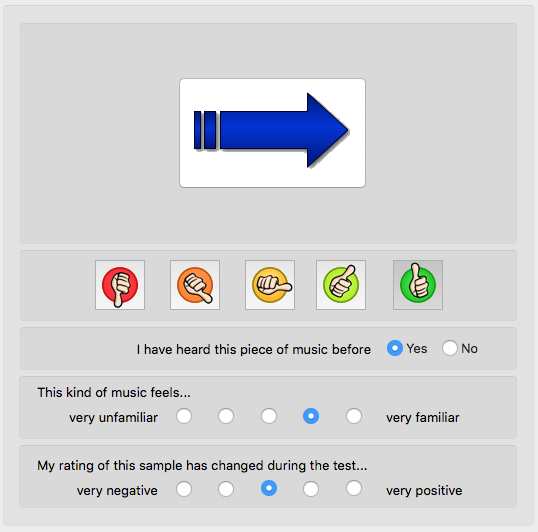Hauptinhalt
Topinformationen


Open-Earedness
Hargreaves remark on the development of "open-earedness" after which the impartiality, openness and curiosity of children to unknown or unusual musical styles decreases with increasing age has been verified since 2001 in a series of studies. For their studies with elementary school children, Gembris and Schellberg developed a sounding questionnaire with 8 music examples of different styles which were heard in the classroom and rated by each child in terms of pleasure on a smiley-scale (Gembris & Schellberg 2007). Open-earedness should show as the consent or at least neutral assessment of examples that were unusual for the children. The results showed that the pop-examples were generally rated best, while, with increasing age, the other styles experienced increasing rejection, so that Hargreaves was considered confirmed. Follow-up studies used different evaluation methods (eg Kopiez & Lehmann 2008), or focused on the interference between declining open-earedness and string class education (Louven 2011), but always retained the research design and some of the music examples. This basic design has been discussed controversially. The problem that the questionnaires asked for a preference judgement while the conclusion rated the openness to the style of music was at the core of the criticism. There is, however, a difference between liking a piece of music and being curious and willing to deal with it - even if one does not like it immediately. It is therefore more likely for open-earedness to show in the readiness to listen to music of any kind over an extended period of time and on a self-determined basis. Based on these considerations, the programme OpenEar as a new methodological approach to the diagnosis of Open-Earedness was developed at the University of Osnabrueck.
References
Louven, Christoph: "Offene Ohren für Klassisches bewahren. Eine Langzeitstudie zu den Auswirkungen des Klassenmusizierens auf den Musikgeschmack" (Neue Musikzeitung 4/2010) Download
Louven, Christoph: Mehrjähriges Klassenmusizieren und seine Auswirkungen auf die "Offenohrigkeit" bei Grundschulkindern. Eine Langzeitstudie (Diskussion Musikpädagogik 50, 2011, S. 48-59) Download
Louven, Christoph & Ritter, Aileen: Hördauer statt Präferenz - Ein computergestützter Untersuchungsansatz zu Hargreaves' "Offenohrigkeit" (Abstract zur DGM-Tagung Osnabrück 2011) Download
Louven, Christoph & Ritter, Aileen: Hargreaves' "Offenohrigkeit" - Ein neues, softwarebasiertes Forschungsdesign. in: Knigge, Jens [Hrsg.]; Niessen, Anne [Hrsg.]: Musikpädagogisches Handeln. Begriffe, Erscheinungsformen, politische Dimensionen. Essen: Die Blaue Eule 2012, S. 275-299. - (Musikpädagogische Forschung; 33) Download
Louven, C. (2014): ‚Offenohrigkeit‘ – Von der Notwendigkeit eines Paradigmenwechsels bei der Erforschung von musikalischer Toleranz und Neugier. Jahrbuch Musikpsychologie, 24 (Offenohrigkeit - ein Postulat im Fokus), 45-58.
Louven, Christoph (2016): Hargreaves’ ‘open-earedness’ – A critical discussion and new approach on the concept of musical tolerance and curiosity. Musicae Scientiae. Access on Journal Page

OpenEar
OpenEar is a software for presenting computer-aided sounding questionnaires that was designed at the University of Osnabrück. The programme can both collect the voluntary listening duration and the preference ratings of each user and calculate/determine the value of the Osnabrueck Open-Earedness Index (OOI). The music samples can be chosen ad lib while the programme sequence can be regulated flexibly using multifarious adjustable parameters. Hence, OpenEar can also be utilized as universal tool for sounding questionnaires within in the framework of musico-psychological and musico-pedagogical tasks. OpenEar runs in English, German, and Spanish localization.

The fundamentally revised version OpenEar 2 runs under the following systems:
- macOS X 10.14 or later (Intel and Apple Silicon);
- Windows 10 or later (32 or 64 bit);
Current Version: 2.0 (1/6/2023)
Changes:
- Simplified activation of the licence files.
- Basic separation of the programme file from the licence and project files.
- New project management: with OpenEar 2 it is now possible to manage several projects with different test settings and to switch quickly between the projects.
- Opening of projects via drag & drop as well as via a history list.
- significantly simplified settings dialogues
- general code improvements
Downloads current version
Older versions
This Demo-Version is limited to 3 music examples. For acces to the full version, please contact christoph.louven@uni-osnabrueck.
To install the licence file, open it in the info dialogue that is displayed when the program is started. The next time OpenEar is started, the licence should be recognised automatically.

